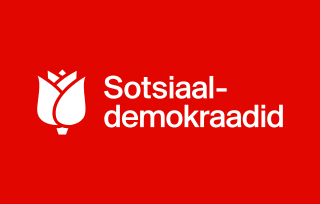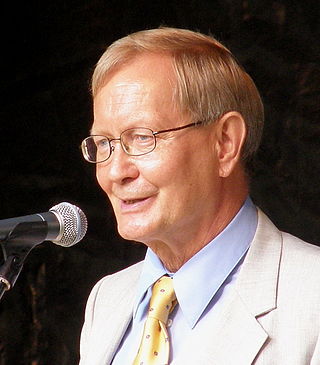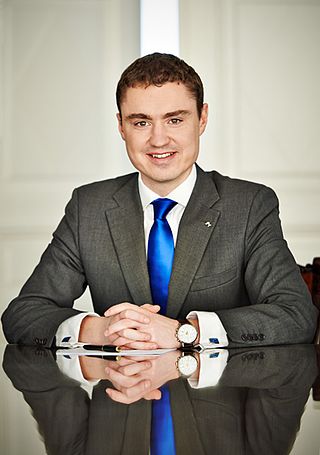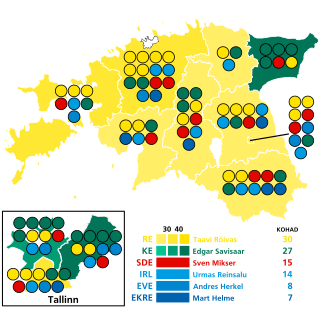
The history of Estonia forms a part of the history of Europe. Humans settled in the region of Estonia near the end of the last glacial era, beginning from around 9000 BC. Starting with the Northern Crusades in the Middle Ages, Estonia became a battleground for centuries where Denmark, Germany, Russia, Sweden and Poland fought their many wars over controlling the important geographical position of the country as a gateway between East and West.

Juhan Parts ( is an Estonian politician who was Prime Minister of Estonia from 2003 to 2005 and Minister of Economic Affairs and Communications from 2007 to 2014. Juhan Parts is a member of Isamaa party.

The Estonian Centre Party is a populist political party in Estonia. It was founded in 1991 as a direct successor of the Popular Front of Estonia, and it is currently led by Mihhail Kõlvart.

The People's Union of Estonia was a political party in Estonia. Its last leader was Margo Miljand.

The Estonian Reform Party is a liberal political party in Estonia. The party has been led by Kaja Kallas since 2018. It is colloquially known as the "Squirrel Party", referencing its logo.

The Social Democratic Party is a centre-left political party in Estonia. It is currently led by Lauri Läänemets. The party was formerly known as the Moderate People's Party. The SDE has been a member of the Party of European Socialists since 16 May 2003 and was a member of the Socialist International from November 1990 to 2017. It is orientated towards the principles of social-democracy, and it supports Estonia's membership in the European Union. From April 2023, the party has been a junior coalition partner in the third Kallas government.

Tunne-Väldo Kelam is an Estonian politician and former Member of the European Parliament (MEP) from Estonia. He is a member of the Pro Patria and Res Publica Union, part of the European People's Party.
The Pro Patria Union was a national-conservative political party in Estonia. The party was founded on 2 December 1995 from a merger of the Estonian National Independence Party and the Pro Patria National Coalition.

Mart Laar is an Estonian politician and historian. He served as the Prime Minister of Estonia from 1992 to 1994 and from 1999 to 2002. Laar is credited with having helped bring about Estonia's rapid economic development during the 1990s. He is a member of the centre-right Isamaa party.

Parliamentary elections were held in Estonia on 2 March 2003. The newly elected 101 members of the 10th Riigikogu assembled at Toompea Castle in Tallinn within ten days of the election. Two opposing parties won the most seats, with both the Centre Party and Res Publica Party winning 28 seats in the Riigikogu. Res Publica was able to gain enough support in negotiations after the elections to form a coalition government.

Andrus Ansip is an Estonian politician, a member of the European Parliament, the former European Commissioner for Digital Single Market and Vice President of the European Commission, in office from 2014 until 2019. Previously, he was Prime Minister of Estonia from 2005 to 2014 and chairman of the liberal Estonian Reform Party from 2004 to 2014.

Taavi Veskimägi is a former Estonian state official and politician and the managing director of the Estonian electric power transmission system operator Elering.

Parliamentary elections were held in Estonia on 4 March 2007. The newly elected 101 members of the 11th Riigikogu assembled at Toompea Castle in Tallinn within ten days of the election. It was the world's first nationwide vote where part of the voting was carried out in the form of remote electronic voting via the internet.

Isamaa is a Christian-democratic and national-conservative political party in Estonia.
Pro Patria National Coalition Party was an Estonian political party founded in 1992. In 1995, it merged with the Estonian National Independence Party into Pro Patria Union.

Urmas Reinsalu is an Estonian politician who served as Minister of Foreign Affairs from 2022 to 2023 and previously from 2019 to 2021. Before that, Urmas has served as the Minister of Defence between 2012 and 2014, and Minister of Justice from 2015 to 2019. Reinsalu is a member and current leader of the Isamaa ("Fatherland") political party, and was the party leader from 2012 to 2015.

Taavi Rõivas is an Estonian politician, former Prime Minister of Estonia from 2014 to 2016 and former leader of the Reform Party. Before his term as the Prime Minister, Rõivas was the Minister of Social Affairs from 2012 to 2014. On 9 November 2016 his second cabinet dissolved after coalition partners, Union of Pro Patria and Res Publica and Social Democratic Party, sided with the opposition in a no confidence motion. At the end of 2020, Rõivas announced quitting politics, and resigned from his parliament seat.

Parliamentary elections were held in Estonia on 1 March 2015. Advance voting was held between 19 and 25 February with a turnout of 33 percent. The Reform Party remained the largest in the Riigikogu, winning 30 of the 101 seats. Its leader, Taavi Rõivas, remained Prime Minister. The newly elected 101 members of the 13th Riigikogu assembled at Toompea Castle in Tallinn within ten days of the election. Two political newcomers, the Free Party and the Conservative People's Party (EKRE) crossed the threshold to enter the Riigikogu.

The Estonian Free Party was an Estonian centre-right political party founded in 2014. The last chairman of the party was Heiki Lill. The party gained 8 seats after passing the 5-percent threshold in the 2015 Estonian parliamentary elections.

















